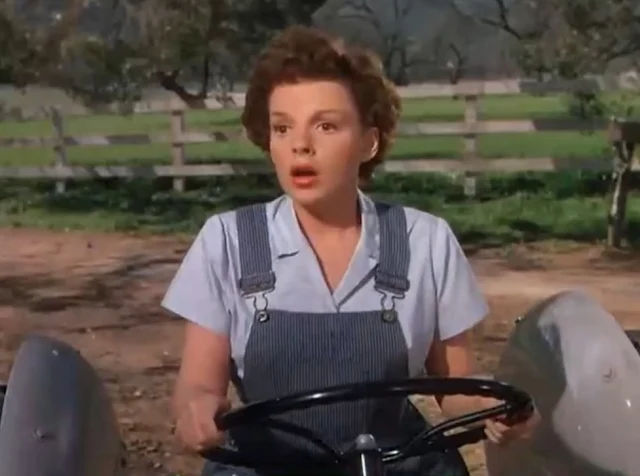 |
| Esther Williams, Gene Kelly, Frank Sinatra, and Betty Garrett in Take Me Out to the Ball Game |
Energetic almost to the point of frenzy, Take Me Out to the Ball Game had a legendarily troubled production. Although the credited director is Busby Berkeley, he reportedly had some sort of breakdown early in the filming and the direction was taken over by Gene Kelly and Stanley Donen, who are also credited with coming up with the rather thin story, as well as the choreography. Esther Williams, who later confessed her unhappiness with the shoot, was not the first choice for female lead, but Ginger Rogers turned it down and Judy Garland was deemed too unwell to take on the role of K.C. Higgins, the woman who inherits a baseball team on which Kelly's and Frank Sinatra's characters are star players. Williams doesn't even get her usual water ballet extravaganza, but just a turn in a swimming pool that sets the ogling Kelly and Sinatra characters in pursuit of her. Though Sinatra was in the midst of his early fame as an idol of the bobby-soxers, he wasn't considered handsome or strong enough to be a romantic lead, so he lost Kathryn Grayson to Kelly in Anchors Aweigh (George Sidney, 1945). This time, Kelly's Eddie O'Brien wins K.C., and Sinatra's Dennis Ryan is left with Betty Garrett's character, as the Sinatra character would be in On the Town (Kelly and Donen, 1949). Take Me Out to the Ball Game belongs to the peak MGM Technicolor musical era, and it was produced by the head of the musicals unit, Arthur Freed, but it's a decidedly second-rank movie. Although billed third, after Sinatra and Williams, Kelly takes over, including a long solo number, "The Hat My Dear Old Father Wore Upon St. Patrick's Day," in which he dances jigs and shows off Irish step-dancing moves, as well as borrowing a few of James Cagney's familiar struts and stiff-legged movements. The best Freed Unit musicals can leave you exhilarated, but the clumsy plot, the flat romance (Kelly and Williams have no chemistry), and the mediocre songs of this one are more likely to induce exhaustion.





















